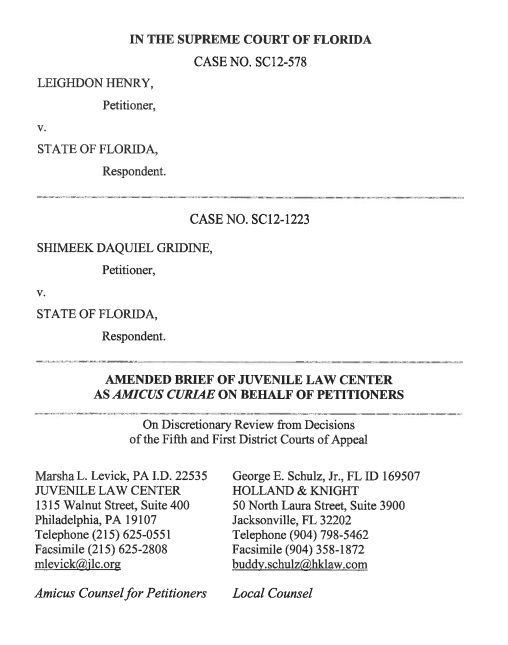
Summary of Argument
This case raises a question of exceptional importance regarding the application of Graham v. Florida in determining what constitutes an illegal sentence under the United States Supreme Court’s Eighth Amendment jurisprudence as it relates to children. In Graham v. Florida, 130 S. Ct. 2011 (2010), the Supreme Court held that sentencing a juvenile to life without parole for a non-homicide offense violated the Eighth Amendment’s prohibition on cruel and unusual punishment because of the unique characteristics of youth that make children less culpable, in addition to the developmental differences between children and adults that make it more likely that a child can reform.
The heart of the Court’s holding was that, as a result of these qualities, any sentence for a non-homicide offense that provides no “meaningful opportunity to obtain release” before the end of the child’s life is unconstitutional. Id. at 2033. Just last year, the Court reiterated the importance of scientific and social science research that demonstrates fundamental differences between juveniles and adults and lessens a child’s “‘moral culpability.’” Miller v. Alabama, 132 S. Ct. 2455, 2464-65 (2012) (quoting Graham, 130 S. Ct. at 2027).
Petitioners Gridine and Henry were sentenced to 70 and 90 years in prison, respectively, for non-homicide offenses they committed as children. Pursuant to Graham, sentences of 70 and 90 years without the possibility of parole are not constitutional sentencing options for children—a group of offenders who are fundamentally different from adults and categorically less deserving of the harshest forms of punishments. The sentences imposed provide Petitioners no opportunity for release within their normal life expectancies.
Under Graham, youth convicted of non-homicide offenses must be guaranteed a “meaningful opportunity to obtain release”—even if that opportunity does not actually result in release. 130 S. Ct. at 2030. Petitioners were denied that opportunity when they were sentenced to terms of years that are functionally equivalent to life sentences. Because these sentences deny each Petitioner any opportunity for release within their life expectancies, this Court should find their sentences unconstitutional under Graham.